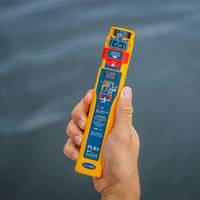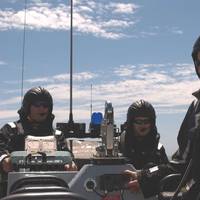ASGARD: Developing an Anti-Spoofing Weapon

Saab and GMV are collaborating in ASGARD, an EU-funded project that aims to improve maritime security when using GNSS and OSNMA. The project addresses the growing threat of GNSS spoofing and other cyberattacks on navigation systems used in the maritime industry.The ASGARD project, run by Saab and GMV, is an ambitious European Union (EU) initiative that aims to develop advanced technologies to improve Global Navigation Satellite System (GNSS) and Open Service Navigation Message Authentication (OSNMA) security in maritime environments.
Personal Locator Beacons Improve the Chance of Rescue at Sea

New Year’s Eve is a time of celebration and remembrance. Three years ago, on December 31, 2019, as the new year was being rung in across the lower 48 states, a tragedy was playing out in icy Alaskan waters. The fishing vessel Scandies Rose, with seven crew members aboard, encountered severe icing conditions and high winds and waves as it transited from Kodiak to fishing grounds in the Bering Sea. The crabber tried to make it to Sutwik Island to shelter from the storm; however…
Lithium Ion Battery Fires: A Threat to Container Shipping

From 2015 to present an estimated 250 incidents related to electric hoverboard fires have been recorded according to the United States Consumer Product Safety Commission. The same commission reports that 83,000 Toshiba laptop batteries were recalled in 2017 due to fire and safety concerns.In January 2017 a NYC garbage truck was the source of a neighborhood surprise when a Lithium ion battery exploded in the compactor of the truck. Luckily no one was injured.According to a study conducted by the National Fire Data Center branch of the U.S.
SAFETY: Distractions Can Sink Careers

Familiarity can and does breed contempt. You don’t need anything else added to that heavy burden.We live and work in a frenetic environment replete with a wide range of both human and technological distractions. When those two elements came together on the bridge of a towboat traveling downriver to pick up a load of empty barges, the result was career-changing for the vessel’s first mate, who was on the wheel. It was yet another costly reminder of the need for professional mariners…
Workboat Communications Evolve to Meet Myriad Missions

Choosing next generation communication systems for professional marine operations can be a daunting task. Not to worry: John Haynes provides a primer. Over the past decade we have come to expect fast, seamless global communications from a single device that fits in our pocket. The age of the smart phone and tablet enables multiple voices talking in a conference call and real time transfer of data, ranging from documents to photos and videos. In the modern bridge, most crew members have a GPS in their pocket which can identify where that person is on the planet.
Night Moves on America's Waterways
Overnight operations are certainly not unusual on America’s inland waterways, but that doesn’t make them any less hazardous. Onboard activities that seem so straightforward and customary in the light of day can take on a decidedly different feel after the sun sets and darkness envelopes the river and shrouds its banks. And, while navigational aids on the river and electronic equipment on board clearly assist nighttime vessel movements, many towboat and tug operators will tell you that fatigue, boredom and endless repetition in the sensory-deprived environment of darkness present very formidable challenges to even the most experienced rivermen.
Maritime Communication: A Bold New Shape and Direction

Richard Simonian is the President of Maritime Solutions, a business unit within Harris CapRock Communications. MR picked his brain for insights on the shape and direction of maritime comms. We understand that you recently unveiled your Advanced VSAT solutions at Satellite 2014. Can you give us a brief on exactly what this is? The problem increasingly being faced by ship and rig operators is that their communication needs are dynamic, yet the traditional buying approach is static. They have had two choices.
Bill, Portable Electronic for Pilots
Representative Tauscher (D-CA) introduced a bill (H.R. 1100) to authorize the Commandant of the Coast Guard to issue regulations that require certain pilots on vessels operating in designated waters to carry and utilize a portable electronic device equipped for navigational purposes, and for other purposes. (2/14/09). (Source: Holland & Knight)
Cruise Ships on Pirate Alert
According to a recent Globe and Mail story, a recent foiled attempt by modern-day pirates on the Seabourn Spirit cruise ship off the coast of Somalia demonstrates the effectiveness of security precautions that have become standard procedure on cruises. The International Maritime Organization requires that every cruise ship operating anywhere in the world have a security officer and between six and 20 crew whose only job is security, according to the story. The Seabourn Spirit is one of the smallest cruise ships in operation, yet the attackers couldn't get near enough to try to board it. The ship’s captain took the ship into a high-speed evasive maneuver designed to swamp the oncoming boats, and 161 passengers, were moved to a lounge for safety.
Comments Requested on GPS Interference
The USCG is requesting information from vessel operators on problems with, and potential solutions to, GPS system interference. The USCG states mobile telephones and other electronic devices employing Mobile Satellite Services (MSS) can interfere with GPS systems. This interference has the potential to adversely affect the safe navigation and operation of vessels using GPS technology. These problems resulted from the assignment of adjacent radio frequencies to MSS and GPS systems. Because of the proximity of their radio frequencies, the relatively high powered MSS transmissions can interfere with GPS receivers. One possible solution being considerd would be the limitation or restriction of MSS on certain maritime vessels…












